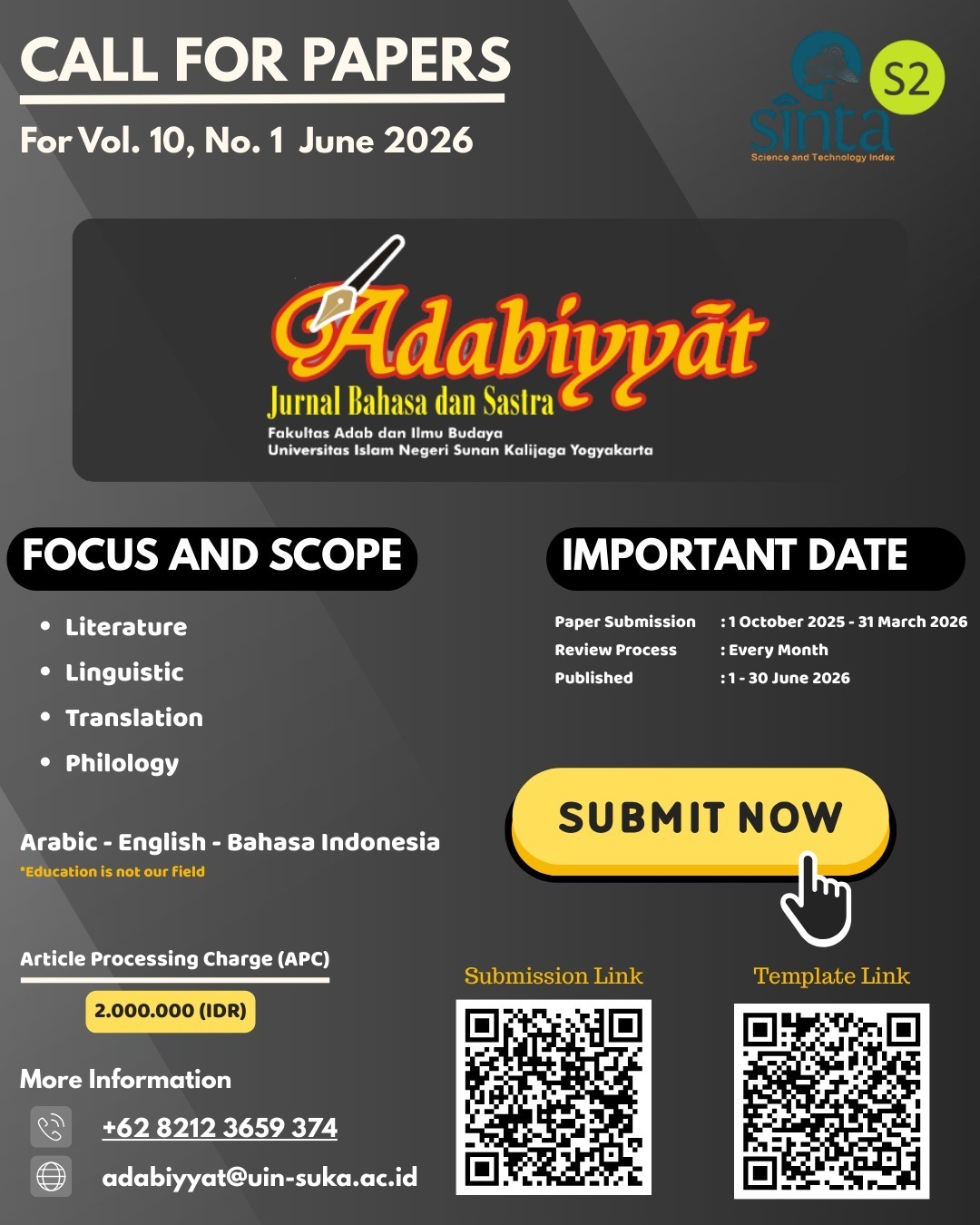CROSS-CULTURAL ROMANCE: DIGITAL FICTION FORMULA IN LIBYA’S LA’NAT AL-‘ISHQ AND INDONESIA’S ABIGHEA
DOI:
https://doi.org/10.14421/ajbs.2023.07024Keywords:
romance, comparative literature, formulaic literature, cyber literatur, WattpadAbstract
The popularity of the digital literary platform Wattpad has been recognized globally, including in Indonesia and Libya. Among various studies on fiction published through Wattpad, this research focuses on a comparative analysis of romance formulas written by popular Wattpad authors from two countries: La'nat al-'Ishq by Hams Yosef in Libya and Abighea by Chelsea Karina Aelia in Indonesia. The main issue addressed in this study is whether romance stories in digital fiction from these countries share the same narrative formula despite the cultural differences between the authors and their readers. The comparison is conducted using John G. Cawelti’s theory of formulaic literature and a descriptive-analytical method. The findings indicate that the dominant formulas in both fictions are the idealization of the main characters, love triangles, and happy endings. This suggests that, although these works are set in different cultural and linguistic contexts, their romance formulas reflect universal desires and expectations of young readers concerning the romance genre.
Downloads
References
Aolia, Chelsea Karina. 2021. “Abighea.” Wattpad. 2021.
Bogdan, Robert C., dan Sari Knopp Biklen. 1998. Qualitative Research for Education: An Introduction to Theory and Methods. Ed. 3. Boston: Allyn and Bacon.
Brooks, Peter. 1995. The Melodramatic Imagination: Balzac, Henry James, Melodrama, and the Mode of Excess. Ed. Reprint. New Haven: Yale University Press.
Cawelti, John G. 1976. Adventure, Mystery, and Romance: Formula Stories as Art and Popular Culture. Chicago: University of Chicago Press.
Cunningham, Michael R., Alan R. Roberts, Anita P. Barbee, Perri B.
Druen, dan Cheng-Huan Wu. 1995. “‘Their Ideas of Beauty Are, on the Whole, the Same as Ours’: Consistency and Variability in the Cross-Cultural Perception of Female Physical Attractiveness.” Journal of Personality and Social Psychology 68 (2): 261–79. https://doi.org/10.1037/0022-3514.68.2.261.
El Guindi, Fadwa. 1999. Veil: Modesty, Privacy and Resistance (Dress, Body, Culture). Oxford: Berg Publishers.
Falaq, Janata Shoji Al, Suprayogi Suprayogi, Felissia Nofita Susanto, dan Annisa Ul Husna. 2021. “Exploring The Potentials of Wattpad For Literature Class.” Indonesian Journal of Learning Studies (IJLS) 1 (2): 98–105.
Fiske, John. 2002. Television Culture. London: Routledge. https://doi.org/10.4324/9780203133446.
Ghaziani, Amin, dan Delia Baldassarri. 2011. “Cultural Anchors and the Organization of Differences: A Multi-Method Analysis of LGBT Marches on Washington.” American Sociological Review 76 (2): 179–206. https://doi.org/10.1177/0003122411401252.
Mcmurran, Mary Helen. 2010. The Spread of Novels: Translation and Prose Fiction in the Eighteenth Century. Princeton: Princeton University Press. https://www.jstor.org/stable/j.ctt7shvg.
Moughrabi, Fouad M. 1978. “The Arab Basic Personality: A Critical Survey of The Literature.” International Journal of Middle East Studies 9 (1): 99–112. https://doi.org/10.1017/S0020743800051722.
Pinasthika, Lalitya Talitha. 2020. “Why They Use Wattpad: An Emotional Design Analysis on the Free Online Reading Platform.” Dalam Proceedings of the International Conference of Innovation in Media and Visual Design (IMDES 2020), 136–43. Amsterdam: Atlantis Press. https://doi.org/10.2991/assehr.k.201202.067.
Pramatanti, Enggar Dhian. 2018. “Peran Reader dan Follower terhadap Struktur Novel: Kajian Sastra Cyber Wattpad.” Dalam Seminar Nasional Struktural 2018, 298–310. Semarang: Universitas Dian Nuswantoro. https://doi.org/10.33810/274185.
Sharot, Stephen. 2015. “Social Class in Female Star Personas and the Cross-Class Romance Formula in Depression-Era America.” Screen 56 (2): 172–94. https://doi.org/10.1093/screen/hjv018.
Sugiyono, Sugiyono. 2021. Metode Penelitian Kuantitatif Kualitatif dan R&D. Ed. 2. Bandung: Alfabeta.
Yosef, Hams. 2015. “La’nat al-’Isyq.” Wattpad. 2015.
Zunshine, Lisa. 2006. Why We Read Fiction: Theory of the Mind and the Novel. Ohio: Ohio State University Press. https://www.jstor.org/stable/j.ctt1kgqwk8.
Downloads
Published
Issue
Section
License
Copyright (c) 2023 Reza Sukma Nugraha, Eva Farhah, Azka Nurzanah

This work is licensed under a Creative Commons Attribution-ShareAlike 4.0 International License.
- Adabiyyāt: Jurnal Bahasa dan Sastra publishes all articles entirely in full text.
- It is permissible for readers to download and to use it for scientific purposes and scientific dissemination.
- The author can re-publish the article that has been published by the Adabiyyāt: Jurnal Bahasa dan Sastra after obtaining written permission from the editor. This letter can be obtained by submitting a request letter for permission to republish the article to Adabiyyāt: Jurnal Bahasa dan Sastra via email adabiyyat@uin-suka.ac.id. In the second publication, the author is required to include information that the article was firstly published by the Adabiyyāt: Jurnal Bahasa dan Sastra.









